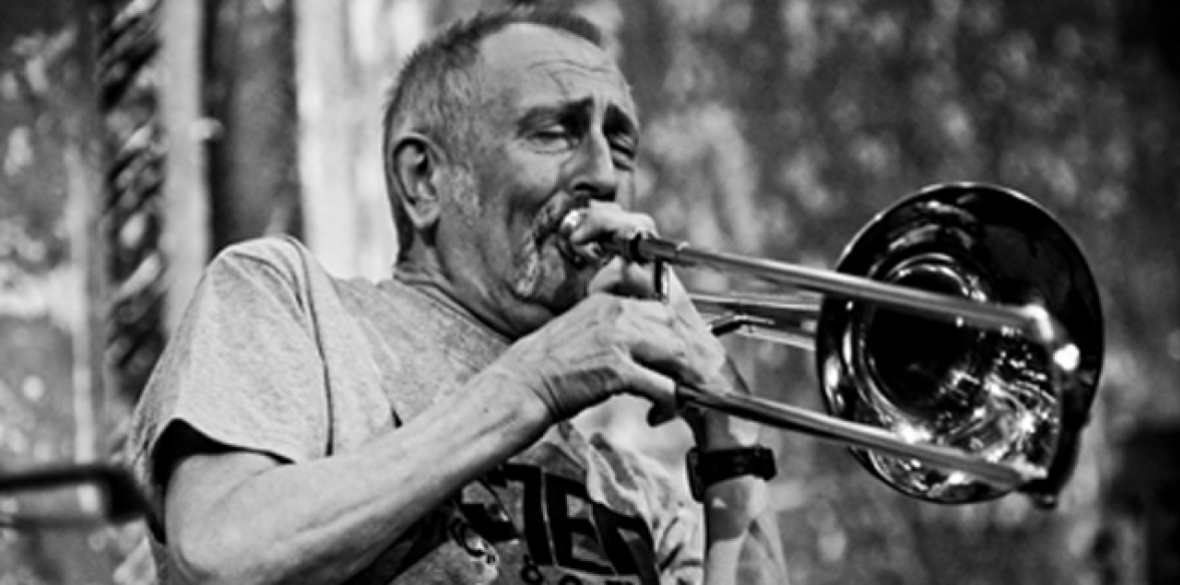This is the last article you can read this month
You can read more article this month
You can read more articles this month
Sorry your limit is up for this month
Reset on:
Please help support the Morning Star by subscribing here
IT’S 12 years since the death of that singular and innovative free-jazz trombonist Paul Rutherford (1940-2007), a lifelong socialist and Morning Star supporter.
Now a revelatory album new album, In Backward Times, reveals his particular genius and the groundbreaking multisonic approach he brought to his instrument.
Talking to his sister Chris Callaghan about their post-war south London childhood, it’s clear how their family life forged Rutherford’s music.
Their communist father spent the 1930s looking for a secure job and, ironically, it was the outbreak of war which enabled him to find work in Woolwich Arsenal.
“Blackheath was truly a village and a great place to spend a childhood,” Callaghan recalls. “Dad used to take us to the park and tell us about the Soviet Union. He had a greyhound with rickets — someone had given him the dog in payment of a debt. I remember Paul once bought me a box of chocolates on hire purchase from the local sweet shop!”
Music always played an important part in the family, thanks mainly to her classical music-loving father. But it was her brother who introduced her to singers like Billie Holiday and Bessie Smith and Shostakovitch was his all-time favourite composer.
The British jazz scene at that time was almost entirely trad. Ken Colyer was making waves and Chris Barber played regularly at the Shakespeare pub in Woolwich.
“I thought of them — rather unfairly— as the social democrats of jazz,” she laughs. “Our record player would most often yield to the voices of Robeson, Gigli and Caruso.”
Her brother’s development as a musician took strength from time in the RAF in Germany. There he providentially met guitarist Derek Bailey and drummer John Stevens. “But he didn’t ‘describe’ his music,” Callaghan says. “He would sometimes get frustrated at a lack of appreciation of its entirely new directions.
“To the uninitiated, his music was challenging. He was also highly self-critical and despaired at his perceived underachievements. But I remember Beethoven’s words which he hung on his bedroom wall: ‘I shall grasp fate by the throat. It shall never defeat me, never’!”
Rutherford particularly appreciated his time with the Mike Westbrook Brass Band in the 1970s. “He respected him as friend and musician and playing to a working-class audience was always a bonus to him,” Callaghan says.
“Stevens and saxophonist Evan Parker were a part of Paul’s musical life from an early stage, as were bassist Barry Guy and pianist Keith Tippett and his wife Julie. The German saxophonist Peter Brotzmann stayed at our parents’ house and I also remember Paul playing with folk-rockers McGuinness Flint at one time.”
According to Callaghan, her brother “could have had a much easier life had he not chosen to follow a path which placed restrictions on his well-being.
“He was someone very easy to love and admire — very well-read and well-informed about many topics. He inherited dad’s great sense of humour and justice, together with his storytelling skills.
“We were overwhelmed by the messages of sympathy and appreciation that arrived after he died. They revealed his capacity for friendship and loyalty.”
Rutherford’s trombones were bequeathed to the Cuban people, an idea which came from fellow trombonist Alan Tomlinson. “We felt Alan’s idea was brilliant and one which Paul would certainly have approved. He played in Cuba and admired the Cuban people immensely.”
Many of Rutherford’s qualities are there in the music of In Backward Times, issued by his old friend Martin Davidson on Emanem Records.
His outrageous wit, the griot’s stories in the solo improvising tracks, his revolutionary horn sound, his respect and comradeship with brilliant co-musicians pianist Veryan Weston, cellist Marcio Mattos and bassist Paul Rogers and the sheer collectivism and democratic principles that mark the music he made with others are all there.
They’re present too in Rutherford’s unique trombone slide-songs, which shine from the very midst of “backward times” to times that are even more backward now.











